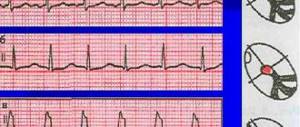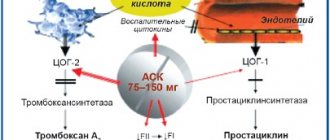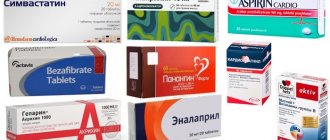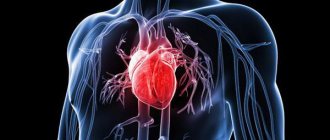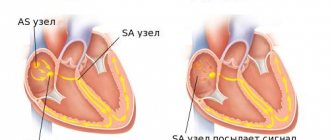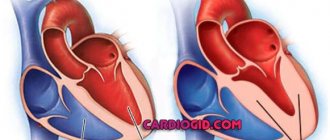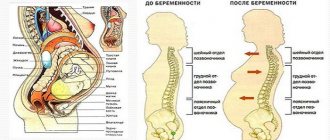Aspirin , or acetylsalicylic acid, is a medicinal substance belonging to the group of so-called non-steroidal anti-inflammatory drugs.
It includes drugs familiar to many, such as ibuprofen (Nurofen, Faspik, Advil), nimesulide (Nimesil, Nise), meloxicam (Movalis, Artrosan) and some others, but only aspirin has a unique effect on platelets.
Aspirin does not thin the blood.
In fact, it is a myth that aspirin thins the blood. How “thin” a person’s blood is depends on the content of hemoglobin and red blood cells in it (a person with anemia has more “watery” blood), as well as on the amount of fluid consumed. Aspirin reduces the ability of blood to clot, that is, to form blood clots, and does not affect its “thickness.”
How does aspirin work?
It blocks the action of the enzyme cyclooxygenase in the body, thus reducing the synthesis of special substances - prostaglandins.
Prostaglandins are involved in the processes of inflammation, in the regulation of vascular tone, muscle contractions, protect the wall of the stomach and intestines from chemical damage and promote the formation of blood clots when the walls of blood vessels are damaged.
Platelets are pieces of cells that constantly float through the bloodstream. In some situations, they can “activate” and stick together, forming a blood clot. As a rule, this occurs when a vessel is damaged - an injury or a cut, and helps the body avoid large blood losses.
Cardiovascular diseases are currently the leading cause of death in the world and in Russia, and first of all we are talking about coronary heart disease and myocardial infarction, as well as ischemic stroke.
Cardiovascular diseases are currently the leading cause of death in the world.
Most heart attacks and strokes occur when blood flow to an area of the heart or brain is blocked by a blood clot.
And it all begins gradually, with the development of atherosclerotic vascular disease. This is the name of the process in which a gradual accumulation of cholesterol, cellular breakdown products and calcium occurs in the inner layer of the vascular wall - an atherosclerotic plaque is formed. Atherosclerosis usually affects large and medium-sized arteries, and the plaques themselves often grow to such a size that they begin to significantly impede blood flow.
But the real problems begin when the plaque becomes brittle and ruptures. The body reacts to a ruptured plaque in the same way as to a ruptured vessel, saving itself from major blood loss - it tries to “patch” the damage by covering the area with a blood clot, and platelets are the first to arrive at the site of damage. A ruptured plaque “misleads the platelets” and becomes the site of the formation of a blood clot, partially or completely blocking the blood flow.
If a blood clot blocks a vessel supplying blood to the heart, myocardial infarction develops; if it supplies blood to the brain, an ischemic stroke occurs.
In recent decades aspirin has firmly entered our lives as a drug that helps maintain heart health, and has practically become a “vitamin for the myocardium.” Anyone can go to the pharmacy and buy aspirin without a prescription.
Daily use of low-dose aspirin (usually 50-100 mg per day) has been considered an effective way to reduce the risk of myocardial infarction, ischemic (that is, associated with decreased cerebral blood flow) stroke, and other problems associated with impaired vascular blood flow.
However, in 2017-2019, several large medical studies were conducted that changed the point of view of doctors on this drug.
The data obtained concerned patients who did not have coronary heart and vascular disease, heart attacks or strokes in the past, but who took the drug to prevent them in the future.
The first found no benefit from aspirin in patients at low risk of developing cardiovascular disease.
The second unexpectedly showed an increase in overall mortality in older people without cardiac disease who took aspirin as prophylaxis.
The third found a high risk of bleeding that outweighed the benefit of aspirin in most patients at moderate risk of developing cardiovascular disease, and identified a group of people who benefit from prophylactic aspirin.
Finally, to find out how many people take preventative aspirin, a survey was conducted in the United States of more than 14,000 men and women over 40 years of age. It turned out that about a quarter of healthy people take aspirin for preventive purposes, and a quarter of these people decided to take aspirin treatment on their own, without consulting a doctor. Moreover, half of respondents aged 70 years and older, and without cardiovascular disease, took aspirin daily.
A quarter of healthy people take aspirin for preventive purposes.
Unfortunately, taking any medicine, regardless of its study and breadth of use, is simultaneously associated with both health benefits and the risk of complications.
Aspirin, while reducing the formation of blood clots in the body, has serious side effects, which are the “other side of the coin” - gastrointestinal bleeding, as well as severe intracerebral, intraocular and intraarticular hemorrhages.
There must be very good reasons for recommendations for its preventive use!
So, when should a cardiologist recommend that a patient take low-dose aspirin every day?
- Firstly, this is necessary for those patients who have already experienced one or more strokes or myocardial infarction. The risk of developing a recurrence in such people is almost 8 times higher compared to those who have never been sick. This kind of prevention is called secondary (we try to prevent the second and subsequent cardiovascular accidents)
- Prophylactic treatment is also necessary for those who have not had a heart attack, but who previously had a stent installed in the coronary artery, or for those who have undergone coronary artery bypass surgery. The doctor will also prescribe aspirin to someone who has been diagnosed with angina pectoris - pain in the chest during physical (less often emotional) stress associated with atherosclerotic narrowing in the coronary vessels
- Aspirin is infrequently prescribed to patients with atrial fibrillation, heart valve disease or prosthetic valves - usually when more effective drugs cannot be prescribed
- Aspirin is used to treat atherosclerotic changes in the arteries of the legs - with these problems, patients experience severe pain in the calf muscles when walking, this is called “intermittent claudication”
- And finally, the most difficult situation is prescribing aspirin to a patient who does not yet have any cardiovascular diseases in order to prevent their occurrence. The so-called “primary prevention” of the disease
Please remember that for people over 70 years of age who do not have cardiovascular disease, taking preventive aspirin is generally not recommended, it will not provide any benefit, and the risk of severe bleeding is very high.
For people over 70 years of age who do not have cardiovascular disease, preventive aspirin is generally not recommended.
Aspirin prophylaxis currently recommended for people 50–69 years of age with a low risk of bleeding and a greater than 10% risk of heart attack or stroke over the next 10 years of life. Risk factors include male gender, diabetes, frequent high blood pressure, smoking and high cholesterol levels in blood tests.
Compatibility of aspirin with other drugs
Aspirin and non-steroidal anti-inflammatory drugs
So, just as aspirin and non-steroidal drugs (ibuprofen, naproxen, etc.) tend to thin the blood, their combined use increases the risk of bleeding. Therefore, you can take these drugs at the same time only under the supervision of a doctor. If it is not possible to consult a doctor, then before meeting with him, you can follow the following advice:
The interval between taking a non-steroid and aspirin should be 8 hours; if absolutely necessary, a non-steroid can be taken 30 minutes before taking aspirin.
Aspirin and anticoagulants
Anticoagulants (warfavin, dabigatran, rivaroxaban, etc.) do not combine well with aspirin and can cause severe bleeding. Nevertheless, there are situations when a person is forced to combine these drugs, for example, after surgery to transplant an artificial heart valve, but such a patient requires careful medical supervision.
How do you know that the benefits outweigh the harm?
The doctor, with your help, will collect and analyze many factors and then make a decision. You yourself can try to assess your risks using an online calculator developed by American cardiologists.
Remember that arterial hypertension itself is not an indication for prescribing aspirin if the patient does not have a diagnosis of coronary heart or brain disease! On the contrary, poorly controlled, high blood pressure is often a contraindication to the use of aspirin, since sudden increases in blood pressure increase the risk of intracerebral bleeding, and aspirin can significantly increase it.
In addition, aspirin may reduce the effectiveness of some drugs used to treat hypertension, such as enalapril, captopril, lisinopril, perindopril, and beta blockers.
If taking preventative aspirin turns out to be unreasonably dangerous for you, your doctor will suggest other prevention options, such as lifestyle changes or taking statins.
Currently commercially available are predominantly low-dose enteric-coated aspirin tablets. The outer shell “dissolves” only in the small intestine, protecting the stomach from irritation. These tablets must be swallowed whole without chewing.
There are also combination preparations containing the additive magnesium hydroxide. It is believed that magnesium in this combination reduces the harmful effects of acetylsalicylic acid on the mucous membrane of the stomach and intestines.
And don't use aspirin if the tablets smell strongly of vinegar—the medicine has probably gone bad!
In order for aspirin to effectively protect your blood vessels, it is prescribed for daily long-term, usually lifelong use. Most likely, you will not feel any changes in your body after starting treatment - but this does not mean that aspirin does not work!
Instructions for use and dosage of “Heart Aspirin”
The drug is taken orally.
Aspirin should be taken orally after meals with a sufficient amount of liquid. Usage period: no more than 5 days. For a longer period, a doctor's consultation is necessary. Children under 15 years of age are not recommended to take it. It is important to follow the correct dosage as it varies depending on the nature of the disease.
| Goal of therapy/prevention | Dose | |
| One-time | Daily allowance | |
| Pain/fever/rheumatic diseases | 0.5–1 g | Up to 3 g |
| Migraine | 1 g | 3 g |
| Stroke | ― | 125–300 mg |
| Myocardial infarction | ― | 300–325 mg |
Studies show that Aspirin is effective at a dosage of 75–325 mg per day. For high blood pressure, it is recommended to take a dose 10 times less than the standard dose. Reduce the dose or increase the time interval between taking tablets if the functioning of the liver or kidneys is impaired.
Aspirin and blood pressure
Some patients often have a question: does Aspirin really lower blood pressure? Although there is no absolutely exact answer to this question, studies have shown that acetylsalicylic acid has some effect on blood pressure. When complaining of high blood pressure, patients are often prescribed Aspirin Cardio, Cardiomagnyl, etc. But sometimes you can also take regular Aspirin. Cardiologists say that “Aspirin” is not as effective for high blood pressure, but is better suited for the prevention of heart attack/stroke. With low pressure, on the contrary, the medicine can relieve headaches, and with intracranial pressure, this is the best option for reducing indicators.
To avoid increased blood pressure, doctors advise taking Aspirin in small doses before bed. This can significantly alleviate the condition and prevent diseases of the cardiovascular system. Low blood pressure is not particularly dangerous, but it negatively affects the general condition of the body. Therefore, doctors may recommend taking medication to improve performance.
While taking Aspirin and outside of therapy, it is better to give up coffee, as this drink increases blood pressure.

